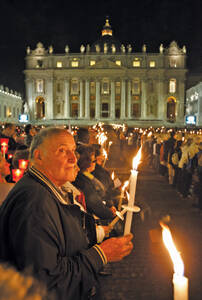Marking the 50th anniversary of the opening of the Second Vatican Council and the start of a special Year of Faith, Pope Benedict XVI called on Catholics to revive the “authentic spirit” of Vatican II by re-proposing the church’s ancient teachings to an increasingly Godless modern world.
The pope spoke at a special Mass in St. Peter’s Square on Oct. 11, half a century to the day after the opening ceremonies of Vatican II, before 400 bishops from around the world, including 15 of the 70 surviving members of the 1962-65 council. The Orthodox ecumenical patriarch, Bartholomew of Constantinople, and Archbishop Rowan Williams of Canterbury attended as special guests.
Vatican II, Pope Benedict said, had been “animated by a desire...to immerse itself anew in the Christian mystery so as to re-propose it fruitfully to contemporary man.” He noted that Blessed John XXIII, in his speech at the opening of the council, called for both the safeguarding and the effective teaching of the “sacred deposit of Christian doctrine...this certain and immutable doctrine, which is to be faithfully respected, [and] needs to be explored and presented in a way which responds to the needs our time.”
Pope Benedict’s homily celebrated Vatican II but deplored much of what followed in its wake. Many Catholics misunderstood or ignored the council’s teachings under the influence of secular culture, he said, and “embraced uncritically the dominant mentality, placing in doubt the very foundations of the deposit of faith, which they sadly no longer felt able to accept as truths.... Recent decades have seen the advance of a spiritual ‘desertification.’”
Calling for a revival in the church of the “yearning to announce Christ again to contemporary man,” the pope stressed that any new evangelization “needs to be built on a concrete and precise basis, and this basis is the documents of the Second Vatican Council.”
He reaffirmed past statements rejecting expansive notions of a “spirit of Vatican II” that might be used to justify innovations diverging from traditional doctrine. “I have often insisted on the need to return, as it were, to the ‘letter’ of the council—that is to its texts—also to draw from them its authentic spirit,” the pope said. “The true legacy of the council is to be found in them.”
During a private audience the next day, Pope Benedict fondly recalled the council, saying it was a time that was “so vivacious, rich and fruitful.” He praised Blessed John XXIII’s usage of the term “aggiornamento” or “renewal” for the church, even though, he said, it is still a topic of heated and endless debate.
“But I am convinced that the insight Blessed John XXIII epitomized with this word was and still is accurate,” he said. “Christianity must never be seen as something from the past, nor lived with one’s gaze always looking back because Jesus is yesterday, today and for all eternity,” Pope Benedict said. “This ‘renewal’ does not mean a break with tradition; rather it expresses a lasting vitality.”








